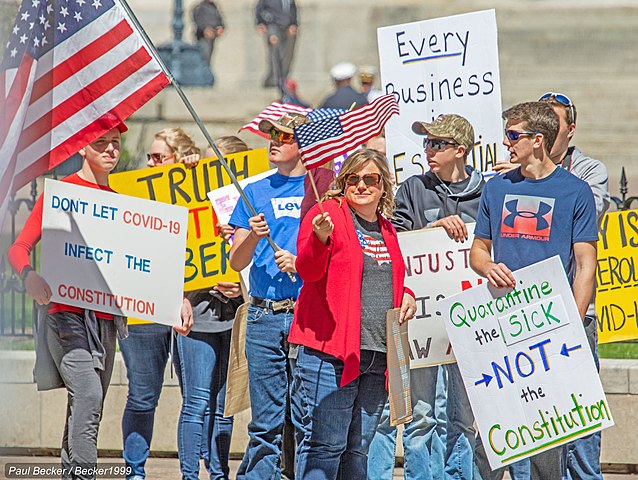Unequal Social Distancing Continues to Scar America During COVID-19
Is social distancing being enforced unequally based on race? A police officer in New York City was videotaped slapping and punching a 33-year-old for failure to properly adhere to social distancing guidelines.
Video shows Officer Francisco Garcia, in plain clothes and not wearing a protective mask himself, punching Donni Wright in the face and shoulder before being arrest for assaulting a police officer and resisting arrest. Garcia can be heard cursing at bystanders. The police department claims that the Wright “took a fighting stance against the officer” when Wright was ordered to disperse.
The implications of police brutality suggest a double-standard as armed white protesters around the country demand their state and local governments lift shelter orders. Protesters often threaten
Michigan Governor Whitmer for refusing to lift the shelter order even though firearms are still permitted inside the state capitol building. Even in New York City, pictures on Twitter showed hordes of white people huddled together in parks on the other side of the city.
 The Natural Inequality of Quarantines
The Natural Inequality of Quarantines
Most shelter orders are constitutional on their face. The text of a shelter order does not specify or suggest any issues based on race, religion, gender, or other equal protection concerns. The days when laws explicitly mentioned race, like segregation laws after the Civil War, are long behind us.
The issue today is not whether laws are written equally but whether laws are equally enforced. The debate about racism after the end of segregation has focused on whether non-intentional racism built into current power structures or subjective enforcement of laws should be addressed.
COVID-19 is simply accelerating issues that were relevant before like Black Lives Matter and the National Anthem Protests. The pre-existing issues with police brutality were about subjective enforcement of laws. Mr. Wright’s case is another case in a long line of cases where subjective charges such as “resisting arrest” are invoked.
COVID-19 regulations are more objective in comparison. Wearing masks and maintaining a distance of six feet can be measured objectively without resorting to the opinion of a police officer. Lawmakers cannot rewrite the rules to make them more equal; police departments need to apply the rules more fairly.
Solving this issue will mean that COVID-19 regulations should either be more rigorously enforced or enforced less. The latter means that COVID-19 guidelines should be almost voluntary – the state cannot tell anyone to wear a mask or enforce social distancing measures.
The former means that many of the protests should be forced to adhere to the same guidelines. Of course, many of the protesters are visibly armed. It is easier for the police to enforce rules against people who won’t fire back at officers. But states must either take the hard road to ensure that the rules apply to everyone, let the social distancing experiment fall apart, or see continued escalation of racial tensions in their communities.
The Exemptions for Essential Business are Unequally Enforced
The inequality of social distancing is not limited to racial relationships and police enforcement. Although racial tensions are exasperated by unequal enforcement, the laws are at least fair in the text themselves. In contrast, exemptions for “essential” businesses are readied with contradictions.
For instance, big convenience stores like Wal-Mart and Target are permitted to open while more focused stores are not. Wal-Mart and Target sell food but customers can also buy clothing, electronics, and other non-essential items from them. Stores like Best Buy and JC Penney have been forced to close for most of the pandemic. This has pushed businesses like JC Penney into bankruptcy but smaller businesses are also feeling the pinch.
The designation of essential business also has an adverse and unequal impact on labor, assuming that their businesses are still open. White-collar workers are more likely to work remotely and thus avoid COVID-19 and the potential healthcare costs from being infected.
In contrast, blue-collar workers like Wal-Mart cashiers or meat-packing workers are exposed daily. They are the ones forced to take on the burdens of this virus even though they may make less than white-collar office employees.
This pandemic will widen the pre-existing rifts in this country. America’s response must be more focused than it is today or there will be more inequality longer after the shelter orders are lifted.
Do I Need an Attorney for Help with COVID-19 Related Discrimination?
You should consult with an employment law attorney if you need to file a claim for discrimination. An employment law attorney can help you determine and assert your rights, gather evidence, and guide you through the process of filing a claim with the EEOC. Additionally, they can help you file a civil lawsuit against the employer, and represent you in any court proceedings.
Civil law matters can be complex, and each state will handle the cases differently. You may need to find a civil lawyer in your area who can help you with the filing and with the various stages of trial. Your attorney can conduct the research needed for your case and will be able to represent you and guide you through the lawsuit process.


Comments